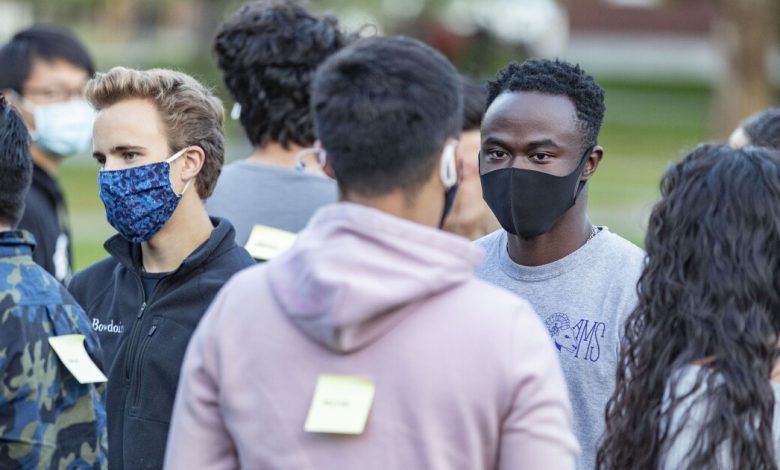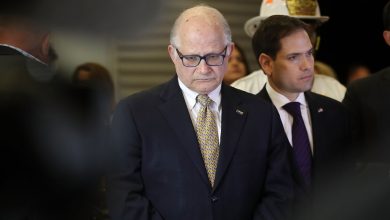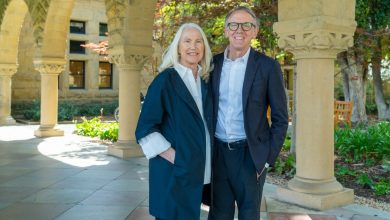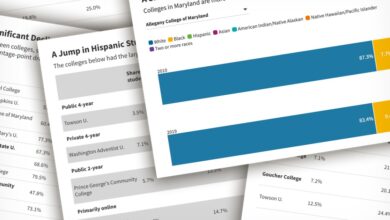As Covid Cases Fall, Colleges Are Relaxing Restrictions. But Experts Urge Caution.

[ad_1]
Colleges, like other institutions across the country, are loosening their public-health protocols as Covid-19 cases decline from their historic peak.
Officials at Louisiana State University at Baton Rouge credited declining case numbers nationally and in the region with allowing them to drop the institution’s mask mandate, starting on Monday.
At the Johns Hopkins University, officials also cited lower active case numbers on campus, as they lifted some restrictions related to guests in dormitories and for club and athletic events in early February. The decision came a week after officials announced that indoor university dining would reopen at half capacity.
Bowdoin College, in Brunswick, Me., made similar alterations at the end of January. Officials announced a return to in-person dining for students, at 50-percent capacity for two dining halls, and said that masked and vaccinated spectators will be allowed at home athletic events.
Experts cautioned that colleges should be careful about how they alter their safety restrictions. “I think we have to be careful,” said Gerri Taylor, co-chair of the Covid-19 task force for the American College Health Association. “I think we have to be thoughtful and intentional about what we do when we decide to lift our mitigation practices that we’ve had in place.”
We’re not in a cookie-cutter situation right now.
While case numbers have dropped significantly on many campuses and in their regions, Taylor worries about whether officials are getting the correct numbers, with many people now turning to at-home rapid tests. “They may not be reporting that to anyone,” Taylor said. “They may be where, if they test positive, they are isolating themselves — or not.”
Kaye Bender, president of the American Public Health Association, noted the importance of institutions working with local health departments to understand their situations specifically as they make plans to change protocols. “We’re not in a cookie-cutter situation right now,” Bender said. “We’re in a situation where what it might be OK to do in one part of the country, or in one state, might vary significantly in the next state.”
It is important for colleges to really look at the numbers on their campuses, from the number of people sick in dormitories to athletes and members of sororities and fraternities, in addition to paying attention to other measures like hospitalizations, Taylor said.
“If all of those measures that would indicate more disease are going down, then it may be reasonable to begin to cut back a little bit, but to do it gradually and carefully, and to be cautious in their approach,” Taylor said.
While the case numbers from the Omicron surge are dropping, Taylor said, we have no way of knowing if a similar surge will happen again. “We can’t predict whether it will change back again with a new variant or if things will get worse,” Taylor said.
As colleges begin changing health protocols, some have alluded to a public-health approach that begins to treat the virus as endemic.
In a December letter to students, Rice University’s president and provost, David Leebron and Reggie DesRoches, respectively, said the campus community had demonstrated it could “live with the virus in a relatively safe manner.”
“For that reason, we will begin to shift our policies to a posture that recognizes Covid-19 as endemic and facilitates our ability to deliver the best education and opportunity to our students, while still taking reasonable precautions,” Leebron and DesRoches said in the letter. That means “generally fewer restrictions that inhibit our activities,” they wrote.
Bender, a former college dean, understands the challenges college officials face in making these decisions. As the virus changes, so do guidelines, and that can be frustrating for the public, she said.
Bender said the American Public Health Association is encouraging colleges to work closely with state and local health departments as they make those decisions. “It’s not an all or nothing; it’s a gradual continuum of activities,” she said.
[ad_2]
Source link






